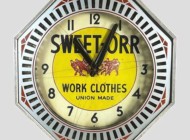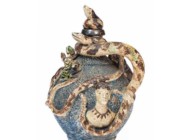NEW YORK CITY – It’s Art and Antique Dealers League Of America and National Antique and Art Dealers Association of America vs Seggos.
An appeal has been filed challenging New York’s display restriction for antiques sales. According to the trade groups, which are represented by attorney Alan Sash, partner at the New York City-based law firm of McLaughlin & Stern, working as co-counsel with the Pacific Legal Foundation, Manhattan’s antiques district is filled with galleries where customers can physically inspect valuable antiques before buying them. But shops cannot display all the merchandise they are allowed to sell. Federal law allows sales of antiques containing ivory that are at least 100 years old, but if antiques contain more than 20 percent ivory, state law bans their sale to New Yorkers and prohibits their display in New York dealers’ stores. Dealers may only show photos or catalog listings of that merchandise to in-store visitors, and only if a “not for sale in New York” disclaimer is included. The dealers sued for the right to sell the items as allowed under federal law, and to display the actual items with that same disclaimer, on First Amendment grounds, but were rejected by a federal trial court. Because government cannot ban displays of items that are legal to sell, two trade associations are fighting back on behalf of their members.
The Art and Antique Dealers League of America is the oldest and principal antiques and fine arts organization in the United States. Formed in 1926 to connect and support dealers and collectors, the league today has more than 110 members representing more than 60 different fields of expertise. The National Antique and Art Dealers Association of America is a selective, invitation-only nonprofit trade organization of leading dealers in the United States.
Members of both organizations have galleries and shops in New York, many in Manhattan’s antiques district. As with most valuable items they say, in-person viewing is an important aspect of antiques sales, especially antiques containing ivory.
Recognizing that there is no evidence of a connection between antiques and modern elephant poaching, federal law allows the sale of older antiques containing ivory, as well as newer items containing a small amount of ivory.
Specifically, the rules allow interstate and international commerce in “antique articles” that are at least 100 years old, as well as non-antique artwork containing “de minimis” amounts of ivory that is at least 45 years old and has been in the United States for at least 30 years.
Lawmakers in New York, however, added more limitations. The state passed an ivory law in 2014 that prohibits display and sale of antiques with more than 20 percent ivory – even though New York acknowledges that they may be sold to buyers in other states and internationally.
The New York law allows dealers to show store visitors the items only in photographs and catalogs, and only if the items are labeled as “not for sale in New York.”
Virtually no one is willing to purchase valuable antiques without first physically inspecting them, the dealers groups contend, so they have sued for the right to sell the items consistent with federal law, and to be able to display items with the same “not for sale in New York” disclaimer. They were rejected by a federal trial court.
Both dealer organizations are appealing the lower court’s ruling to the US Second Circuit Court of Appeals. On June 15, an appeal was filed naming Basil Seggos, in his official capacity as the commissioner of the New York State Department of Environmental Conservation, the Humane Society of the United States, Center For Biological Diversity, Natural Resources Defense Council, Wildlife Conservation Society and others. It essentially contends that not only does federal law exempt the sale of antique ivory pieces from federal trade prohibitions, but that the New York state display restriction violates the First Amendment to the US Constitution. “Because the Display Restriction targets commercial displays of antiques and art containing ivory and prevents the Dealers from offering those items for sale and expressing the viewpoint that they are properly sold under federal law, the Restriction is subject to strict scrutiny,” the appeal states. “Even if intermediate scrutiny applies, the Display Restriction fails because it restricts more speech than is necessary to address the illegal ivory trade.”
Attorney Sash said, “We are excited to be working with the Pacific Legal Foundation on this appeal. The appeal raises significant issues about federal law and the First Amendment. The law relating to antique ivory needs to be reviewed. We are confident that the appellate court will carefully examine New York’s Ivory Law during this appeal.”
No hearing date has been set.




